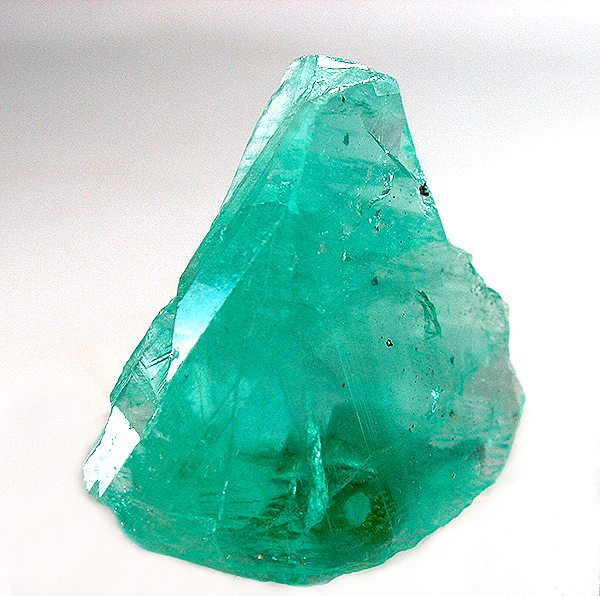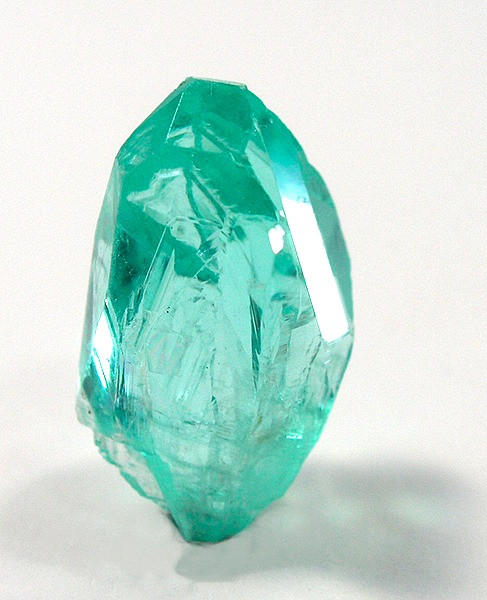
Phosphophyllite Gemstone: Properties, Meanings, Value & More
 Phosphophyllite mineral (faws-fuh-fih-lyte) is a rare and highly-prized sea-green gemstone. In fact, phosphophyllite is a crystal nicknamed “the holy grail of minerals,” a testament to its rarity.
Phosphophyllite mineral (faws-fuh-fih-lyte) is a rare and highly-prized sea-green gemstone. In fact, phosphophyllite is a crystal nicknamed “the holy grail of minerals,” a testament to its rarity.
Is phosphophyllite expensive? Indeed, these crystals are among the hardest to obtain, making them one of the most desirable and expensive collector’s stones.
The phosphophyllite gem's meaning is one of overcoming hardships and healing the mind. It’s a transformative crystal that encourages growth, putting no aspiration out of your reach.
Are you interested in knowing more about this obscure crystal?
Keep reading to learn all about phosphophyllite’s properties, uses, meanings, value, and more in our Phosphophyllite Gemstone Guide.

Phosphophyllite History
Phosphophyllite’s moniker derives from the Greek φύλλον (phyllos) for “leaf,” alluding to the mineral’s chemistry and perfect, leaf-like cleavage.
But who gave phosphophyllite its famous namesake?
German mineralogists Heinrich Laubmann and Hermann Steinmetz officially named the mineral in 1920 after observing phosphophyllite’s composition (a phosphate) and physical structure.
There’s no recorded history of industrial or commercial use for phosphophyllite. That still holds mostly true today. Besides being a favorite collectors’ gem among mineral enthusiasts, phosphophyllite is also a lesser-known favorite among crystal healers (but more on that in a bit).
Let’s take a peek at some other fun facts about phosphophyllite.
About Phosphophyllite Stone
Every month has a traditional birth or zodiac stone that supports each specific zodiac sign. However, phosphophyllite is unique because it’s believed to have high astrological significance, enhancing every zodiac sign.
This rare, semi-precious gemstone is no stranger to pop culture, either!
Phosphophyllite, or Phos for short, is the main protagonist and youngest “gem” in the popular Japanese anime series Land of the Lustrous. True to the mineral’s namesake, the cult-favorite, non-binary character is constantly growing and changing on the show — much like leaves changing colors as the seasons transition.
But what type of gem is phosphophyllite in the real world? Its mineral traits will tell you everything you need to know!
 Image credit: Rob Lavinsky, iRocks.com – CC-BY-SA-3.0
Image credit: Rob Lavinsky, iRocks.com – CC-BY-SA-3.0
Phosphophyllite Specifications & Characteristics
Pastel variations of blue and green typically characterize phosphophyllite’s color (similar to aquamarine). However, some specimens can appear colorless in transmitted light.
In terms of phosphophyllite gem hardness, the mineral sits at 3 to 3.5 on the Mohs hardness scale, making it quite delicate. That, coupled with its brittle tenacity, perfect cleavage, and heat sensitivity, make cutting large crystals a risky endeavor.
Usually, well-developed, phosphophyllite crystals are prismatic to tabular. Twinning is also common — particularly fishtail twinning (when two monoclinic crystals join on the side, one reflecting the other, forming a fishtail) and penetration contact twinning (when the two parts are joined along a complex surface appearing to penetrate through one another).
Here’s an overview of phosphophyllite’s additional mineral data:
Chemical formula: Zn2Fe(PO4)2·4H2O
Mineral family: Phosphates
Composition: Hydrated zinc phosphate
Crystal structure: Monoclinic
Luster: Vitreous
Transparency: Transparent to translucent
Refractive index: 1.59 to 1.62
Density: 3.08 to 3.13
Cleavage: Perfect on [100]; Distinct on [010] & [102]
Fracture: Conchoidal
Streak: White
Dispersion: Very weak
Birefringence: 0.021
Luminescence: Fluorescent; Violet in LW-UV
Pleochroism: Non-pleochroic
Treatments: None known
Physical properties? Check! Time to shift our focus to phosphophyllite’s symbolism!
 Image credit: Rob Lavinsky, iRocks.com – CC-BY-SA-3.0
Image credit: Rob Lavinsky, iRocks.com – CC-BY-SA-3.0
Phosphophyllite Healing Properties
You can use most crystals as healing stones for enhancing your physical, emotional, and spiritual well-being. Phosphophyllite, albeit rare in crystal healing, is no exception.
Beyond its beauty, phosphophyllite is celebrated as a highly transformative crystal for when the going gets tough. Additionally, it helps balance your spiritual body in more ways than one, granting you a more fulfilling life on every level.
Emotionally, what is phosphophyllite used for?
Emotional Healing
Phosphophyllite is associated with overcoming difficulties in all aspects of life. Its vibrations are believed to turn any negative or stressful situation into a positive one.
One thing that makes phosphophyllite so special is that its power is said to get stronger as the degree of stress intensifies — making it a convenient crystal to keep handy during times of uncertainty.
Additionally, phosphophyllite crystal can also help magnify:
Creativity
Motivation
Self-confidence
Strength
Introspection
Open-mindedness
What about phosphophyllite’s spiritual meaning?
Chakra Healing
Some crystals can also be used as chakra stones to help balance and activate one or more of your chakral energy points. Phosphophyllite attunes to your throat (Vishuddha) and heart (Anahata) chakras.
The throat chakra is your hub of communication. When blocked or out of alignment, self-expression and communication breaks down. Phosphophyllite shifts your throat chakra back into balance, empowering you to find your voice and speak your truth for yourself and others.
The heart chakra represents self-love, relationships, and empathy. When closed, you feel emotionally closed off. It gives way to feelings of anger, jealousy, fear of betrayal, and hatred toward yourself and others. Phosphophyllite opens your heart chakra, allowing you to direct love toward yourself, others, and the world around you.
Moving on, how much is phosphophyllite worth? That depends on grading!

Phosphophyllite Gemstone Properties
In gemology, every stone has specific traits and value-determining characteristics that define how they’re graded. These properties help experts appraise gems, so buyers know the true value of the stones they’re investing in.
Almost all phosphophyllite gems for sale are appraised according to color, cut, and carat weight.
Color
Typically, phosphophyllite occurs in shades of blue and green, such as sea green or mint, with little to no visible inclusions. Higher-quality specimens will be more transparent and appear colorless in transmitted light.
Specimens with vivid hues and sparkling brilliance tend to fetch the highest prices.
Cut
Phosphophyllite is so rare and valuable that lapidaries and other artisans often refuse to cut it for fear of breaking the delicate mineral. When phosphophyllite is skillfully faceted, however, it’s typically brilliant or step cut.
Although phosphophyllite’s beauty is enhanced by expert cutting, few large facetable crystals exist. This only adds to making faceted phosphophyllite one of the more desirable and expensive gemstones.
Instead, phosphophyllite gems are usually sold in their rough and natural form. While more affordable than cut specimens, phosphophyllite’s rarity still makes rough gems fetch higher than average prices compared to more mainstream minerals.
Carat Weight
Some localities yield stones of 75 carats or more. However, these superb, rare specimens will undoubtedly never be cut. Most faceted phosphophyllite range from 1 to 10 carats, expertly cut from crystal fragments and broken crystals.
As for raw or rough phosphophyllite, you’ll mainly find it sold in grams (versus carats).
Before phosphophyllite makes it to grading, it has to form.
 Image credit: Rob Lavinsky, iRocks.com – CC-BY-SA-3.0
Image credit: Rob Lavinsky, iRocks.com – CC-BY-SA-3.0
Phosphophyllite Origins & Sources
Phosphophyllite mainly occurs in massive sulfide deposits and granite pegmatites.
Gemmy phosphophyllite forms as a primary precipitate in tin-rich hydrothermal veins. It also occurs as a secondary mineral derived from altered primary phosphates, like sphalerite or triphylite.
Geographically, where can you find phosphophyllite?
Mining Locations
The finest phosphophyllite specimens (and the only ones to be cut and faceted) hail from Potosí, Bolivia. This locality has produced crystals up to 10cm long, transparent, and twinned.
Germany has also produced gemmy phosphophyllite, but only Bolivian stones have been cut.
Other noteworthy localities include:
Australia
Canada
Czech Republic
France
New Zealand
Portugal
Spain
Sweden
United States
Zambia
So how much is phosphophyllite’s rarity going to cost you? Let’s talk about pricing.
 Image credit: Rob Lavinsky, iRocks.com – CC-BY-SA-3.0
Image credit: Rob Lavinsky, iRocks.com – CC-BY-SA-3.0
Phosphophyllite Price & Value
Unsurprisingly, a gem as hard to come by as phosphophyllite is highly valued — especially compared to similar mainstream gems (like apatite or pargasite). Still, you can find the mineral priced more competitively if you know where to look.
As discussed earlier, you’ll mostly find phosphophyllite for sale in its raw, uncut form.
Raw phosphophyllite generally costs around $15 to $30 per gram ($3 to $10 per carat). However, you can find some lower-end pieces for around $2 to $5 per gram ($0.40 to $1 per carat).
For faceted phosphophyllite, the price per carat tends to reflect its rarity. However, if you can find them, faceted gems average around $400 per carat, reaching as high as $1800 per carat.
Similarly, the mineral’s low hardness makes carvings and phosphophyllite jewelry almost impossible to find. As a result, processing the stone into accessories like phosphophyllite rings, phosphophyllite necklaces, and other pieces is difficult and uncommon.
After splurging on such a special stone, you will want to master appropriate gemstone care.
Phosphophyllite Care and Maintenance
Phosphophyllite isn’t necessarily a high-maintenance gem, but its fragility does call for some special attention to its care.
It’s important to note that this mineral is soluble in most acids, so stick to mild detergents when cleaning your gems. Use a soft brush, warm water, and gentle touch when removing impurities. Dry it thoroughly and store it in a cool, cushioned place away from other gems that can cause it to break or fracture.
To keep your phosphophyllite safe and stunning, avoid:
Wearing it during rigorous activities
High heat and extreme temperature changes
Harsh acids and abrasive chemicals
Ultrasonic and steam cleaners
Contact with harder minerals and gems
Turn Negative into Positive with Phosphophyllite!
This rare and captivating gem may be your key to flipping every crisis on its head-turning a rocky situation into something that serves you and your higher self. Its unusual and splendid appearance parallels its metaphysical abilities.
Phosphophyllite may not always be an easy gem to get your hands on, but owning a piece of its beauty and energy is a sparkling opportunity (pun intended).
After all, what avid crystal enthusiast wouldn’t want the “holy grail of minerals” to grace their gem collection?
Search the Gemstone Encyclopedia
Related Auctions
Related Articles
Originally the Birthstones or gemstones were associated with a zodiac sign or the month of a individuals birth. Find out what your stone is and view the stones we have for sale
8th Feb 2021
There are dozens of quartz and chalcedony gems with various colors and patterns. Learn all about quartz properties and every type of quartz, from amethyst and agate to plasma and phantom quartz!
15th Oct 2020
Hackmanite is a pink to violet sodalite gem known for its unique color-change and luminescence. Learn why hackmanite is special, from its rare qualities to the types of hackmanite jewelry available.
28th Mar 2018
Latest Articles
Stibiotantalite is a rare tantalum mineral sometimes found as stunning yellow to orange gems. Discover the history, properties, prices, and uses of stibiotantalite gemstones in this complete guide.
21st Jan 2025
Milarite is a white, green, or yellow beryllium silicate in the milarite-osumilite group. Faceted gems are rare but stunning. Discover the history, properties, prices, and benefits of milarite gems!
6th Jan 2025
Friedelite is an uncommon pink, red, or brown manganese silicate mineral best known from New Jersey and South Africa. Learn the prices, properties, uses, and history of friedelite gemstones.
23rd Dec 2024
Article Categories
How To's is where you will find helpful articles from gem Rock Auctions on how to cut gemstones, select gemstones and buy gemstones.
9 Articles




